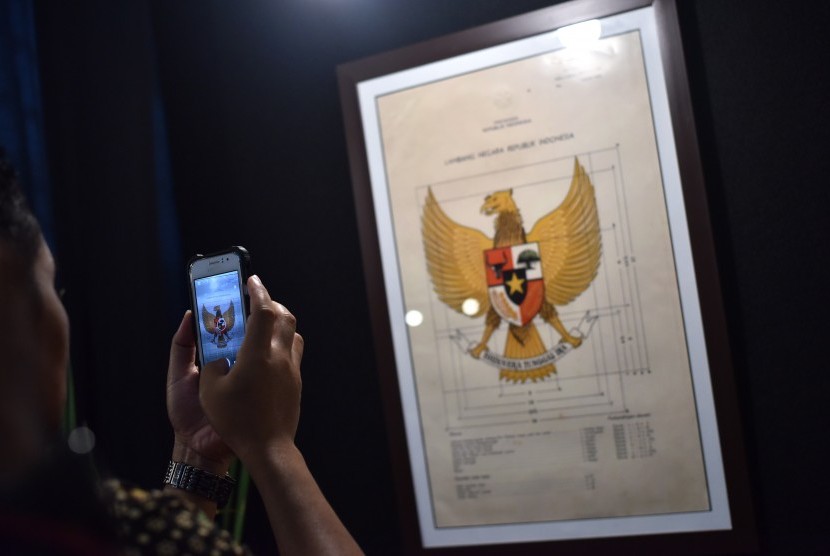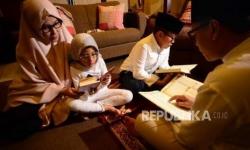By : Bayu Kusuma *)
REPUBLIKA.CO.ID, While Pancasila is final, some groups allegedly brougth up other ideology, such as caliph ideology by Hizbut Tahrir Indonesia (HTI). HTI should return to preaching agenda, and economic development, because that is what needed by the community. HTI should not have the desire to create a state within the state, not carrying the caliph.
So it was stated by Sofiuddin, the author of the book entitled 'Gerakan Politik HTI, Mampukah Menjadi Gerakan Dakwah?' at the book's soft lainching in Islamic Nusantara Center (INC) Wisma Usaha UIN Syarif Hidayatullah Jakarta, recently. This book seeks to resolve the existing problems of HTI.
Sofiuddin added that the book talks about HTI, beginning as a view of HTI. The movement HTI include preaching or political movement, propagation related but politically charged.
Meanwhile, Abdul Mun'in Dz, Deputy Secretary General of Pengurus Besar Nahdlatul Ulama (PBNU), said Pancasila is the product of Islamic scholars' thought. Running Pancasila is the same as running the Islamic Shari'a. Therefore, it is the duty to defend Pancasila. Mun’in also said Hizbut Tahrir as a political movement.
"The presence of HTI, contrary to NU habits, if HTI is left, will make a clash with other Islamic political parties, we are obliged to defend the country. HTI has an international ideology that rejects nationalism. Since the beginning, NU has been very critical. Therefore, NU is very sensitive to the existence of HTI," he said.
Secretray General PP Ansor, Abdul Rochman explained, “"NU and Muhammadiyah consider the Negara Kesatuan Republik Indonesia (NKRI) is a state of agreement and testimony, because the results of ijtihad of scholars, so that will maintain the integrity of NKRI." Hilmi Assidiqie, one of the young leaders of NU said that Indonesia with Pancasila can support religion, not to overlap, Pancasila should be able to protect its citizens who want to practice their shariah religion
Radicalism Dissolving
At a different place, a scientific seminar entitled 'Islam Rahmatan Lil'Alamin, Youth of Islam Love Pancasila, Call to Dissolve Radical Group' held by Alumni of Intelligence Study of Intelligence (IAKSI) University Indonesia in Jakarta.
Speaking at the seminar, H. Nuruzaman said that from history perspective, Hizbut Tahrir as a transnational ideology, became the forbidden party. In Arabia, Egypt, Bangladesh, Pakistan, everywhere being a forbidden organization, in Indonesia thrives into an official organization.
He notes that there are severals groups in Indonesia that have transnational ideology, the first Muslim Brotherhood form the political party in Indonesia, Hizbut Tahrir which became HTI, Salafi or Wahabi, Jihadi meeting of radical Muslim ikhwanul and Salafi radicals, Jamaah Tabligh and Shi'a.
"There are five ideological schools in Indonesia that influence the radicalism battle. Ikhwanul Muslimin is a political party in Indonesia that wants to form an Islamic state. Why Taqiyyudin An Nabhani came out of the Muslim Brotherhood and founded Hizbut Tahrir, because they are different, the Muslim Brotherhood wants to transform itself into a political party and establish a state of Islam, not necessarily the whole world into Islam, and they accept democracy, and Hizbut Tahrir is not accept democracy,"explains H. Nuruzaman.
Meanwhile, Sidratahta Mukhtar stated many Muslim-based countries rejects the existence and those kind of teachings. In the contemporary development of the debate about radicalism, fundamentalism or related, this has undergone tremendous development. This debate is more visible where the sides of the thinking and then how to act, then what we reject.
Radical thinking which is based on the desire to build a political system based on global ummah earlier, based on the idea of unification of people into a system that is global and the desire to restore at least 800 years of khilafah. From the global leadership of Islam to the fall of Turkish Ustmani to a global realm now.
Some observers says how do we see the state doing one supervision or evaluating the development of religious organizations that might be in the past as a mistake. The state in this case, the government, gave consideration that this should be dissolved which is more difficult in the dissolution of radical organizations. The more easily dissolved it will grow other radical organizations that will be difficult to control. How to use education as the most effective means that can ward off radicalism with deradicalization.
*) Researcher in Lembaga Studi Informasi Strategis Indonesia (LSISI)









